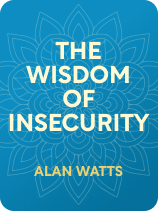

This article is an excerpt from the Shortform book guide to "The Wisdom of Insecurity" by Alan Watts. Shortform has the world's best summaries and analyses of books you should be reading.
Like this article? Sign up for a free trial here.
What’s Alan W. Watts’s The Wisdom of Insecurity about? What’s the solution to anxiety?
The Wisdom of Insecurity is philosopher Alan Watts’s 1951 treatise on the origins of and solutions to modern anxieties. He explains what insecurity is, why it makes you anxious, and how you’re exacerbating anxiety.
Read below for a brief overview of The Wisdom of Insecurity.
The Wisdom of Insecurity by Alan W. Watts
Alan W. Watts’s The Wisdom of Insecurity argues that we feel anxious because the only constant in life is change—which means that seeking security is futile and we should embrace a more realistic approach to life by accepting insecurity and living in the moment instead of worrying about the future.
Watts’s philosophy of insecurity is based on his unique interpretations of both Christianity and Eastern philosophies—he’s best known for translating Eastern concepts into terms Westerners can understand and apply to their lives. He’s the author of several other books on Eastern philosophy, including The Way of Zen and The Book, and his numerous lectures can be streamed through the Alan Watts Organization.
The Origins of Anxiety
Before you can know how to deal with anxiety, you need to understand its cause: insecurity. In this section, we’ll explain what insecurity is, why it makes you anxious, and why trying to resist it can lead to further anxiety.
According to Watts, insecurity—the state of being impermanent and vulnerable to change—is a fundamental quality of existence. He explains that there’s no such thing as security because change is inevitable: One moment passes and is replaced by the next, which means nothing can be frozen in time. Every living thing changes each moment and ultimately transitions from life to death.
Why Insecurity Makes You Anxious
Watts explains that every human has an animal self and a thinking self. Despite the fundamental insecurity of life, many people continue to hope or strive for security because they identify with their thinking selves over their animal selves. Your animal self has two key qualities: It has sophisticated instincts (for example, hunger cues), and it lives in the moment, always in flux—transitioning from hungry to satiated, for example, or from sleepy to alert, depending on the internal and external sensations it perceives. Your animal self doesn’t think, and it’s never concerned with the past or the future; it simply exists in the here and now and acts according to its internal wisdom rather than any abstract rules.
On the other hand, your thinking self is conscious—it’s able to contemplate, remember, and imagine. It also has time consciousness (a sense of continuity between the past, present, and future). Time consciousness makes you believe that you’re a stable, independent entity—since you share memories with your 10-year-old self, you believe you’re the same person you’ve always been. Your thinking self wants to continue being a stable, independent entity—so it resists change and tries to achieve permanence, even though it can’t.
Since your thinking self wants to become permanent, you become anxious about things that threaten your permanence—namely, painful experiences and death. But Watts explains that pain and death are both necessary and valuable parts of life. He says that pain must accompany pleasure because if you experienced a constant stream of pleasure, you’d eventually become numb to it—or it would hurt you, the way too much alcohol can turn you into an addict. Pain punctuates your experience to make pleasure meaningful and enjoyable. Watts argues similarly that death is a good thing—you’d get tired of living if you lived forever.
How You’re Making Your Anxiety Worse
Watts notes that despite the utility of pain and death, your anxiety about these experiences leads you to pursue an endless stream of pleasure. You know your time on earth is limited and that pleasures aren’t promised, so you want to cram as much pleasure into your life as possible. You probably engage in consumerism—the purchasing of goods and services beyond the bare necessities—to make that happen. Consumerism is a vicious cycle: Experiencing one pleasure makes you desire more and better pleasures (for example, you might always be chasing the high of obtaining the newest, fastest car). As a result, consumerism can never satisfy you. Watts says this means that the more you pursue pleasure, the more anxious you become.
As a consumer, you fixate on the future. When you’re experiencing pain, you try to make yourself happy by diverting your attention from your discomfort to ways you can maximize pleasure in the future. However, Watts says that you’ll never experience the future—you can only ever experience what’s happening in this present moment; in the next moment, you’ll experience what’s happening in that present moment. This means that pursuing a future goal is futile. Also, distracting yourself from the present diminishes your ability to fully experience the present. You won’t fully enjoy any pleasurable experience, so you’ll keep seeking out future pleasures, and you won’t be able to deal with and move on from pain. This extends your anxiety.
Therefore, Watts argues that contrary to popular belief, the inevitability of pain and death isn’t what makes life difficult—what makes life difficult is your insistence on pursuing future pleasures and sparing yourself from future pain and death.
Religion, Science, and Insecurity
According to Watts, another way people cope with insecurity is by seeking comfort in religion or science. In this section, we’ll discuss why Watts believes Western perspectives (Christianity and science) on insecurity are inadequate, and we’ll explore the Eastern approach he says is more valuable.
Watts explains that the thinking self attempts to impose order and stability on life by naming and classifying your experiences. For example, labeling an animal you see with the word “dog” helps you predict how that animal will behave. Naming and classifying seems to make life more predictable. Watts says that for much of Western history, people seeking predictability have adopted Christianity, which promises eternal life, an unchanging God, and permanent values. Then, Westerners turned to science, which offered security in the form of immutable, universal laws and the potential of happiness on earth instead of in the afterlife (for example, by reducing suffering with the help of modern medicine).
However, Watts says that around the time he was writing this book (the 1950s), Westerners had found both Christianity and science unsatisfying for the reasons listed above: Focusing on the future is futile and dilutes your experience of the present. This made people feel like life had no meaning, and they turned to consumerism (also futile) for comfort.
How Eastern Spirituality Helps You Accept Insecurity
Based on his understanding of Eastern philosophy, Watts says that using religion and science to cope with insecurity is inadequate for a few reasons. First, it strengthens your tendency to identify with your thinking self over your animal self—you believe you can classify experiences because you’re an objective, outside observer. Watts says that you’re not outside of experience—you are your experience. He reasons that if everyone is their experience, then all of existence is composed of experience—which means that you’re part of an ever-changing, unified whole, rather than a stable, independent entity (your thinking self).
Second, Watts argues that religion and science are merely representations of existence, so they’ll never be fulfilling; clinging to these representations is like clinging to a photo of your friends instead of to your friends themselves. He adds that though religions attempt to represent existence, existence can’t be understood by the thinking self—it can only be understood experientially by the animal self that’s living in the moment. Trying to name and classify existence as an independent, objective observer removes you from the experience, so you’ll miss out on aspects of the experience. For example, according to this logic, you’d learn more about running by going for a run than you’d learn by reading about running or watching others run.
Finally, imposing order on existence by accepting religious or scientific beliefs is a form of your thinking self’s resistance to change, and Watts argues that it’s only by accepting insecurity that you can find spiritual understanding and fulfillment. He says you can have spiritually meaningful experiences when your animal self is living in the moment and your thinking self admires the incomprehensible beauty of existence—a phenomenon he refers to as “wonder.”
However, Watts says that traditional religious beliefs are useful when understood metaphorically. He explains that everything that exists is intricately, irrevocably interdependent and that all iterations of God, in all religions, symbolize the essential unity of all of existence. He encourages you to think of the Christian notion of an eternal afterlife where you’re joined with God as a metaphor—one that symbolizes that the present is the only thing you can ever experience and that you’re always already joined with all other existence.
How to Go With the Flow
Watts argues that according to Eastern religions, you have to give up your thinking self’s attachment to security and embrace your animal self’s capacity for living in the moment. In this section, we’ll discuss his advice for doing so and explore the benefits of this approach.
Watts explains that the thinking self and the animal self each have their uses—for example, the thinking self enables you to communicate with others, while the animal self alerts you to internal cues like pleasure and pain. However, he says that presently, society is tilted heavily in favor of the thinking self—evidenced by our overreliance on human concepts like religion, for example, to guide our decision-making (as opposed to also listening to bodily cues like the sensations that accompany feelings of guilt or comfort). Since you aren’t living in tune with your animal self, you’re anxious—you need time to just experience life, rather than always thinking and talking about life.
Watts says that the solution to this problem is to integrate your thinking and animal selves. This means living in the moment according to your body’s wisdom like an animal would do—eating, sleeping, and doing other activities when your body tells you it’s time to do so, rather than relying on an imposed schedule or dogma to guide your choices. As you do so, your thinking self should be focused on the present, not the past or the future. Watts explains that this is the true purpose of your thinking self—to help you more fully comprehend, or at least appreciate, the present moment. He also says that nobody can teach you how to do this—you’re already doing it, even if you don’t believe you are, so all you have to do is continue and not let your thinking self get in the way.
How Embracing Your Animal Self Makes You Happier
Integrating your animal and thinking selves transforms pain. Watts says when your thinking self is in charge, you try to escape pain by distracting yourself from the experience with thoughts of the past or future. But this is futile because you can’t escape the present—recall that you are your present experience. Distracting yourself from the present only disrupts your ability to understand and accept it, which is necessary if you’re going to move through it. Therefore, distracting yourself from pain only prolongs pain. When you embrace your animal self, you deal with pain like animals do: You’re able to endure the pain as it’s happening, and when it’s over, you move on. Your thinking self focuses on your present experience instead of avoiding it.
Embracing your animal self also helps you more fully enjoy pleasure and avoid causing yourself unnecessary pain. This is because, as discussed, focusing your awareness on the present (instead of the past or future) allows you to get the most out of each moment—for example, you’re going to enjoy the act of gardening more if you’re focused on the sensation of working with plants and dirt than if you’re focused on whether your flowers will bloom in the future.
Watts says that embracing your animal self also prevents you from getting trapped in the painful, anxiety-producing cycle of consumerism.
According to Watts, integrating your thinking and animal selves also gives you a deep, bodily understanding—rather than an abstract idea—that everything that exists is part of an integrated whole. This will enable you to experience true freedom.
Watts argues that when you understand yourself as an individual thinking self, you tend to conceive of freedom as your ability to influence the world. But when you see yourself as part of the whole, you understand freedom as the ability to be part of existence—you can do anything that’s possible because you’re already part of the world of possibilities, and you’ll listen to your bodily cues instead of being restricted by human abstractions like schedules and religion.
Watts says once you have a bodily understanding of essential unity, you’ll stop making decisions based on the unnatural pursuit of pleasure or the avoidance of pain—you’ll simply be going with the flow from moment to moment. In his view, most immoral actions are the result of pursuing pleasure and avoiding pain—prioritizing the thinking self’s desire for permanence over your true momentary needs. Moral actions, on the other hand, are the result of being united with all of existence—which Watts argues is the equivalent of love, since love brings things together. He explains that the combination of living in the present and acting in a loving way is key to a more peaceful, united world.

———End of Preview———
Like what you just read? Read the rest of the world's best book summary and analysis of Alan Watts's "The Wisdom of Insecurity" at Shortform.
Here's what you'll find in our full The Wisdom of Insecurity summary:
- Philosopher Alan Watts's treatise on the origins and solutions to anxieties
- Why seeking security makes us anxious and how to accept insecurity
- How Eastern religions can help anxiety and Western ones make it worse






